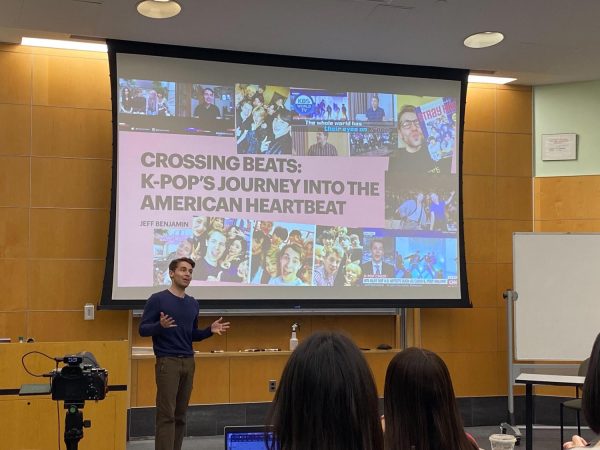
A lecture hall in the Humanities Building was packed with students excited to hear from award-winning music journalist Jeff Benjamin on “Crossing Beats: K-pop’s Journey Into The American Heartbeat” on Friday, April 12. The discussion was part of the Center for Korean Studies’ Colloquium Series and focused on the globalization and localization of Korean popular music, or K-pop, in the United States.
As Billboard’s K-pop columnist and a contributor to media outlets such as The New York Times, CNN and Rolling Stone, Benjamin has extensive knowledge regarding K-pop’s trajectory and has conducted interviews with prominent K-pop groups such as BTS, Red Velvet and NewJeans.
Rather than discussing K-pop’s history from the start with pioneers like the trio boy band Seo Taiji and Boys, or the rise of the first generation of K-pop idol groups in the 1990s, Benjamin jumped to the introduction of K-pop artists in the U.S.
In 2009, solo artist BoA’s self-titled English studio album became the first South Korean artist’s album to enter the Billboard charts. Later that year, the girl group Wonder Girls’ song “Nobody” entered the Billboard charts, becoming the first K-pop group to do so. In the 15 years since K-pop first hit the charts, its influence has only expanded, solidifying its place in the global music landscape.
Benjamin didn’t mimic the lifeless lecturing style of a history professor; instead, he filled his talk with personal anecdotes. He likened his journey to the evolution of K-pop, with the 2000s being a period of self-discovery much like he was going through as a college student at New York University, on the verge of getting kicked out. Despite the challenges, he knew he loved music from all over the world, excited by music and artists exploring different sounds and breaking new ground.
His first internship at Billboard was as an editorial intern. He said that, in hindsight, it was the natural path for him, as he often engaged in online forums discussing his passion for music. In his junior year, he switched his major to journalism and his internship inspired him to work harder.
Benjamin became a fan of the South Korean girl group After School due to the group’s impressive creativity and dedication to incorporating innovative elements like learning different dance styles, which included a drum line in “Let’s Do It,” pole dancing in “First Love” and tap dancing in “Let’s Step Up” — concepts he didn’t see explored in music in the U.S.
Another electrifying artist was PSY, who became internationally recognized for his 2012 viral hit “Gangnam Style” which changed Billboard’s policy for chart placement by incorporating YouTube views into the chart formula. The song’s popularity and ubiquity questioned what types of music could cross over in the U.S. Did music have to be in English to reach such heights?
In the following years, K-pop artists began performing arena concerts in the U.S. and Billboard launched its K-pop column, marking not only a milestone in the trajectory of the genre but also in Benjamin’s career.
Looking at K-pop today and its future, Benjamin believes it’s expanding and becoming increasingly more inclusive. K-pop has made waves not only for Korean music but also branched out to develop groups that perform in different languages including WayV, a subunit of the K-pop boy group NCT, who performs in Mandarin, Korean and English, as well as XG, a Japanese girl group based in South Korea who perform in English.
Benjamin strays away from defining K-pop as a genre because he views genres as a shared sound. Rather, he feels that K-pop varies vastly in its sound and is more of a music scene and community with a unique culture: a culture that includes televised performances on music programs like Music Bank or Inkigayo, and K-pop groups’ variety of YouTube content and collectible items like photocards.
He added that the K-pop industry incorporates these unique elements and a faster turnaround for new music releases to maintain the excitement for artists. As a result, K-pop groups last longer now than they used to, thanks to growing international support.
Following Benjamin’s talk, student presenters provided findings from a survey among students regarding their interest in K-pop. Approximately 40% of the respondents said they were first introduced to K-pop by friends or family, with 30% first being introduced through social media. In addition, 35.4% of respondents said K-pop significantly influenced their understanding or appreciation of Korean culture, with 31.3% saying it had a moderate influence.
In the closing Q&A session, Benjamin discussed the dark sides of the K-pop industry while also drawing parallels to the equally difficult nature of the entertainment industry in the U.S., feeling that the West is quick to dramatize the dark side of K-pop.
He expressed a similar sentiment when he was invited to talk on CNN after the suicide of SHINEE’s Jonghyun, and the first question asked was “did K-pop kill Jonghyun?” In response, Benjamin brought up the music industry’s demanding nature globally, adding his cultural analysis of Korea’s high-pressure society to address the situation.
Benjamin cited some significant problems within the South Korean entertainment industry, including the absence of openly LGBTQ+ K-pop artists and the lack of mental health services, both of which are not normalized in South Korea’s culture. However, he noted signs of progression, including artists who are speaking more freely, including BTS and their socially conscious music that discusses issues like mental health.
As efforts to offer mental health support services to K-pop artists come to fruition to remedy the arduous nature of the industry, Benjamin remains hopeful for K-pop and the music industry as a whole. Sharing his career journey through his love for music, Benjamin showcases how Korean culture is impactful regardless of location, with the hopes that students find their career paths through their passions much like he did.























